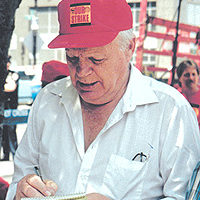The Bushies are having a helluva time getting things straight. On the one hand, they tell us the economy is recovering – that we are, as Lawrence Lindsey, chief White House economic advisor, said recently, at a stage where the economy is “beginning to begin its recovery.” In the next breath, Commerce Secretary Donald Evans says the economy still needs a boost and the Senate should get on the ball and hand out more money to the top one percent in order to stimulate the economy.
They’re wrong on both counts: There is no real recovery and further tax cuts for the super-rich aren’t going to do anything for the economy. If tax cuts for the wealthy created jobs – don’t forget Congress passed a package of cuts last May that will cost more than $2 trillion over the next ten years – then why are people still being laid off and why is more than a quarter of the nation’s manufacturing capacity idle?
As Yogi Berra was wont to say, “It ain’t over ‘til it’s over” and from this perch – and I’ll bet from that of the 8 million people who the government admits are unemployed – it’s a long way from over. If it is true that there’s a recession when you lose your job and a depression when I lose mine, then it’s equally true that the recession, depression – call it what you will – isn’t over until I go back to work. And so far, neither of one of us is working.
Yes, new claims for unemployment are down. But all that means is that fewer people are being laid off, it says nothing about people going back to work. As a matter of fact – and contradictory as it may seem – total employment has fallen by 1.1 percent since its high in March 2000, a larger decline than the average of the previous six recessions.
And yes, fewer people are drawing unemployment insurance benefits, but that’s because some 60 percent of those who file for unemployment insurance never collect a dime and some 11,000 people who do collect benefits are exhausting them every day of the week, including Saturdays, Sundays and holidays. Unless Congress extends them, two million workers will exhaust their benefits over the next six months.
Other numbers shoot down the claim that the economy has begun to turn around:
• A recent survey by the National Association of Manufacturers found that, while 45 percent of its members expected to increase capital spending by as much as 5 percent in the next six months, 38 percent said they anticipated a continued decline in capital spending.
• There’s another, more troubling statistic: Historically, the official unemployment rate has continued to rise for some months after the powers that be make the official ruling that a recession is over. After the end of the last recession in March 1991 the official unemployment rate drifted upward a whole percentage point during the next 15 months, increasing from 6.8 percent to 7.8 percent. In January, the rate was 5.6 percent and will probably inch up to 6 or 6.5 percent by summer’s end.
• In its March 4 issue, Business Week says real gross domestic product will rise 1.5 percent in the first quarter of 2002. But economists at the Economic Policy Institute have told me that the economy must grow by at least 3.5 percent over an extended period if there is to be any dent in the number of unemployed – 1 percent to take care of new entries to the labor force and 2.5 percent to account for productivity increases.
• More than half of the 2.2 million jobs lost in 2001 were jobs held by 16- to 24-year-olds, as the percentage of employed young people dropped by 4 percentage points, a drop nearly four times greater than that for older adults.
• The recession has been disastrous for African-American workers, wiping out nearly all the gains of the 1990s when their employment rate increased by 9 percentage points. Last year the employment rate of young African-Americans declined by 7 percent.
As Yogi said …

MOST POPULAR TODAY

Hold the communism, please: SFMOMA’s Diego Rivera exhibit downplays artist’s radical politics

‘Warning! This product supports genocide’: Michigan group aims to educate consumers

After months of denial, U.S. admits to running Ukraine biolabs

Ohio: Franklin County treasurer attends Netanyahu meeting, steps up Israel Bond purchases

“Trail of Tears Walk” commemorates Native Americans’ forced removal



Comments